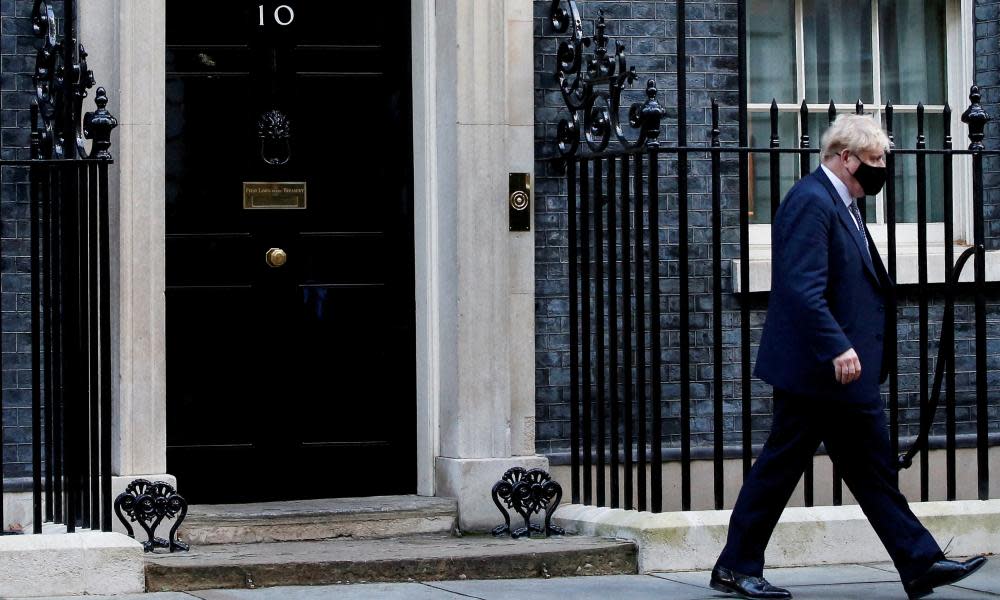Does Boris Johnson expect his half-baked policy wheezes to soothe public anger?

Deploying the military against migrants and attacking the BBC are distractions to buy a beleaguered prime minister time
When all else fails, send in the big guns. Or rather, pretend to. In the 1997 American satire Wag the Dog, a devious president invents a fictional war with Albania to distract voters from an embarrassing sex scandal. And by shamelessly whipping up a patriotic storm, he almost gets away with it.
While Boris Johnson has thankfully stopped short of declaring a war, he appears to be offering wobbling Conservative voters the next best thing: Operation Red Meat, involving threats to deploy the RAF and the navy against migrant boats in the Channel, plus some ritual BBC-bashing and assorted other wheezes designed to buy a beleaguered prime minister time. Presumably, he wants Daily Express readers to be under the vague impression that Britain is ready, if not quite to bomb refugees back to France, then at the very least to up the ante. Like the rest of Operation Red Meat, however, this one whiffs of something long past its sell-by date.
The plan, insofar as it can be called that, is to deploy military assets to track small boats crossing the Channel and escort them ashore for processing, but then shift the actual processing somewhere less appealing than England. (Last time this plan surfaced, it was to be Albania, until the Albanians announced this was the first they’d heard of it; now Rwanda and Ghana are floated.)
The idea of militarising Britain’s response to terrified refugees will of course be offensive and distressing to many. But the twist in the tale for its intended audience of core Conservative voters is that if it works as planned, it could, if anything, make the crossing safer. People are less likely to drown under military escort than slipping ashore unnoticed in the dark. And while the threat of being ushered straight to an asylum processing centre may deter migrants keen to disappear into the black market, it’s less obvious why the two-thirds of boat passengers estimated to end up successfully claiming asylum would fear being whisked into a system they want to enter anyway.
The culture secretary Nadine Dorries’ full-frontal attack on the BBC, declaring “it’s over” for them before the review of its future funding has even begun, looks no better thought through. Like it or not, perhaps there’s an electorally seductive case to be made that viewers who have decamped to Netflix shouldn’t be made to pay for channels they don’t watch. But couching it as a nakedly political attack on the BBC just raises hackles, making any ensuing legislation less likely to get past the House of Lords. Or to put it another way, what a Johnson government promises may not be what a Johnson government actually delivers, something we should arguably all be used to by now.
As recovery plans go, this one is a classic of its hastily conceived kind; chuck a few unfortunate people off the back of the sledge and give the newspapers something else to talk about. Johnson’s principal private secretary Martin Reynolds is duly emerging as the likely fall guy for the May 2020 garden party that the prime minister claims not to have realised was a party; and since Reynolds sent the invite asking staff to bring a bottle, his position does look increasingly untenable. But it remains difficult to believe that an experienced Whitehall official, who had worked with Johnson at the Foreign Office before No 10, somehow went rogue behind his back. Are we really to believe Johnson, that well-known innocent in such matters, was led astray by party animal Sir Humphrey? And to think that Tories used to complain civil servants were stick-in-the-muds.
Related: For the Tory party, Boris Johnson is a blip not a crisis | Nesrine Malik
The new policy agenda, meanwhile, not only falls apart when prodded but lacks a compelling reason for Johnson himself to lead it. There are things, even now, that only Johnson can do; parts of the country only he can reach, emotional registers only he can strike, gambles so wild only he can get away with them. But does any Conservative voter keen to see this stuff enacted really imagine that Liz Truss couldn’t send in the gunboats, or that Rishi Sunak wouldn’t be eyeing up the BBC’s funding? Unlike Brexit, these aren’t concepts requiring the Johnson magic touch to bring them alive, and they don’t even convincingly feel like his idea.
If Operation Red Meat is a strategy for surviving the next few days only, rather than the next few years, then right now it may be the best that an office full of people worrying they might be sacked can manage. If they can just hang on long enough – and Theresa May hung on longer than seemed possible, as her chief tormentor Johnson doubtless recalls – then the shine may well come off potential successors in the meantime. Truss may overplay her hand, or Sunak be tarnished by the cost-of-living crisis. So long as Tory voters tell pollsters they’re switching to “don’t know” rather than directly to Labour, there’s always a chance of winning them back.
But not with a plan that sounds as if it could have been scribbled on the back of a fag packet after a particularly heavy “wine time” session, and not with a leader who still doesn’t seem to understand why people are so angry. It’s not the lack of red meat on the menu. It’s not the way the kitchen operates. It’s that they no longer believe the chef.
Gaby Hinsliff is a Guardian columnist

 Yahoo News
Yahoo News 
